
A Bold Vision for AI Innovation in Alameda
In a surprising move, James Ingallinera, an ambitious startup founder, has proposed a radical plan to President Donald Trump: give him 500 acres of Alameda Point to establish "Silicon Valley 2.0." Ingallinera envisions this project as the "Manhattan Project of our time," aiming to create an independent jurisdiction for cutting-edge technology and innovation.
With a passionate video announcement, Ingallinera outlined his concept of Frontier Valley, which would comprise residential housing, commercial spaces, and offices for startups. However, this ambitious proposal left city leaders caught off guard, with city communications director Sarah Henry stating they had not been contacted regarding Ingallinera's plans. Instead, the city is actively working on a VA medical facility and a regional park on the land allocated for innovation.
The Controversial Push for Startup Cities
Ingallinera’s plan draws upon the broader movement of creating startup cities, sometimes called "network states," which feature privatized governance and loosened regulations. Influential tech figures like Marc Andreessen and Peter Thiel have backed similar initiatives, with proposals for these jurisdictions surfacing in locations as diverse as Honduras, Greenland, and Nigeria. However, this movement has faced skepticism due to its legal and ethical implications.
Local Developments and Immediate Concerns
Despite Ingallinera’s aspirations, the city of Alameda is focused on responsible urban development that benefits local residents and veterans. The VA project and park are seen as long-term contributions to the community, contrasting sharply with Ingallinera's concept of an autonomous startup haven. The lack of communication between Ingallinera’s group and city officials also raises questions about the feasibility of such a grand plan and whether it truly addresses the needs of the community.
The Politics of Land and Innovation
Ingallinera's appeal to Trump aligns with the former president's prior support for creating what he termed "freedom cities" on federal land, a concept that has drawn both interest and concern across the political spectrum. Proponents argue it fosters innovation and economic growth, while critics caution the risks of unregulated development.
Impacts on the Bay Area and Beyond
The proposal has potential implications beyond Alameda, as it reflects a growing trend of tech entrepreneurs seeking to redefine land-use policies. The success or rejection of such projects could influence future developments across the Bay Area, and set precedents for how tech innovations are integrated into municipal planning.
Exploration of Future Innovation Trends
As we reflect on Ingallinera’s proposals, it’s crucial to engage in discussions about what the future of innovation should look like in urban America. Should we allow tech leaders to commandeer large parcels of land for their visions? Or should cities maintain control to ensure the well-being of their communities? These questions are at the heart of debates surrounding technology, governance, and public space in our rapidly evolving society.
Conclusion: A Call for Community Engagement
As discussions unfold regarding Ingallinera's aspirations for Alameda, it's essential for residents to voice their thoughts and engage with local leaders about the future of development in their community. In today’s era of rapid technological advancement, the risks and rewards of such initiatives must be carefully weighed.
Join the conversation about the future of urban development and innovation in your community. Engage with local forums, attend city meetings, or reach out to city officials to express your views and help shape the future of your environment.
 Add Row
Add Row  Add
Add 




 Add Row
Add Row  Add
Add 

Write A Comment